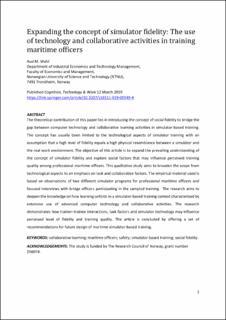Expanding the concept of simulator fidelity: the use of technology and collaborative activities in training maritime officers
Peer reviewed, Journal article
Accepted version

Åpne
Permanent lenke
https://hdl.handle.net/11250/2651877Utgivelsesdato
2019Metadata
Vis full innførselSamlinger
Sammendrag
The theoretical contribution of this paper lies in introducing the concept of social fidelity to bridge the gap between computer technology and collaborative learning activities in simulator-based training. The concept has usually been limited to the technological aspects of simulator training with an assumption that a high level of fidelity equals a high physical resemblance between a simulator and the real work environment. The objective of this article is to expand the prevailing understanding of the concept of simulator fidelity and explore social factors that may influence perceived training quality among professional maritime officers. This qualitative study aims to broaden the scope from technological aspects to an emphasis on task and collaborative factors. The empirical material used is based on observations of two different simulator programs for professional maritime officers and focused interviews with bridge officers participating in the sampled training. The research aims to deepen the knowledge on how learning unfolds in a simulator-based training context characterised by extensive use of advanced computer technology and collaborative activities. The research demonstrates how trainer–trainee interactions, task factors and simulator technology may influence perceived level of fidelity and training quality. The article is concluded by offering a set of recommendations for future design of maritime simulator-based training.